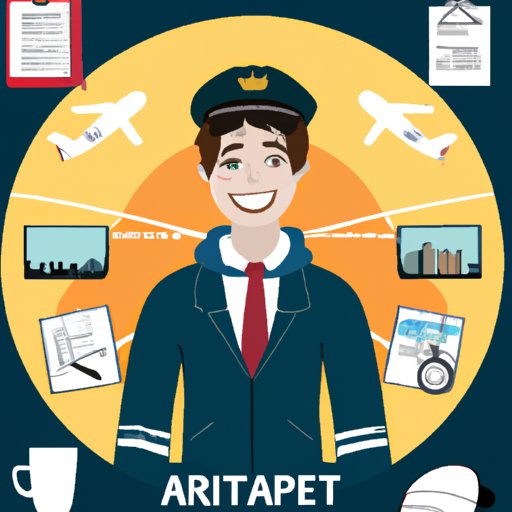Introduction
The career of an airline pilot is one of the most exciting and rewarding professions available. As a pilot, you will have the opportunity to see the world and experience different cultures while flying passengers safely to their destinations. But becoming an airline pilot is no easy task – it requires many years of dedication, hard work, and commitment. In this article, we’ll explore the qualifications, certifications, and training programs required to become an airline pilot, as well as the roles and responsibilities of a pilot, career paths in the industry, and the lifestyle of an airline pilot.
Qualifications and Certifications
In order to become an airline pilot, there are certain qualifications and certifications that must be met. Most airlines require applicants to have a high school diploma or equivalent, as well as a bachelor’s degree in aviation or a related field. Additionally, applicants must have a valid driver’s license and a current medical certificate.
In addition to the educational requirements, pilots must also obtain a number of certifications from the Federal Aviation Administration (FAA). These include an Airline Transport Pilot (ATP) certificate, which allows pilots to fly commercial aircraft, and a Multi-Engine Rating, which allows them to fly multi-engine airplanes. Pilots must also obtain a Flight Instructor Certificate, which allows them to teach others how to fly, and an Instrument Rating, which enables them to fly in instrument meteorological conditions.
Training Programs
Once the educational and certification requirements have been met, aspiring pilots can enroll in a variety of pilot training programs. These programs range from self-paced online courses to intensive onsite flight schools. Each program offers its own unique benefits, so it’s important to do research and choose the program that best suits your needs.
For example, some programs offer hands-on flight training with experienced instructors, while others provide virtual reality simulations that allow students to practice flying in different weather conditions and environments. Additionally, some programs provide access to resources such as study guides, practice tests, and mentorship opportunities.

Roles and Responsibilities of a Pilot
As an airline pilot, you will be responsible for the safe operation of the aircraft. This includes pre-flight checks, monitoring the plane’s systems during flight, and post-flight inspections. Additionally, pilots are responsible for communicating with air traffic control, keeping passengers informed of flight status, and responding to any emergencies that may arise.
Pilots typically work in teams of two, with one pilot designated as the captain and the other as the first officer. The captain is the primary decision maker, while the first officer assists in navigation, communication, and other tasks. Both positions are equally important in ensuring the safety of the aircraft and its passengers.

Career Paths in the Airline Industry
Once you’ve completed your training and obtained the necessary certifications, you’ll be ready to pursue a career in the airline industry. There are several paths available, depending on your interests and goals. For instance, you could become a charter pilot, transporting passengers to their desired destination; a cargo pilot, delivering goods around the world; or a corporate pilot, flying executives and VIPs.
Each path has its own advantages and disadvantages. Charter pilots generally have more flexible schedules and are able to travel to different locations, while cargo pilots often earn higher salaries due to the nature of their work. Corporate pilots, on the other hand, enjoy a more luxurious lifestyle, but may be required to work long hours and travel frequently.

Preparing for Job Interviews and Aptitude Tests
Before you can land a job, you’ll need to demonstrate your skills and knowledge in a series of job interviews and aptitude tests. During the interview, you’ll be asked questions about your experience, qualifications, and motivations. It’s important to be prepared and practice your answers beforehand.
You’ll also be required to take an aptitude test, which measures your cognitive abilities and knowledge of aviation topics. The test typically consists of multiple-choice and essay questions. To prepare, review the syllabus of your training program and brush up on aviation topics such as aerodynamics, navigation, and regulations.
The Lifestyle of an Airline Pilot
The lifestyle of an airline pilot can vary greatly, depending on the type of job you take. Cargo pilots, for instance, may spend weeks at a time away from home, while corporate pilots may be required to travel frequently. However, all pilots must adhere to strict safety protocols and work long hours, often overnight.
Despite the long hours and travel requirements, being an airline pilot can be incredibly rewarding. Pilots get to see the world and experience different cultures, while also providing a valuable service to their passengers. Additionally, the salary of an airline pilot can be quite lucrative, with experienced pilots earning six figures.
Conclusion
Becoming an airline pilot is no easy task, but it can be an incredibly rewarding and fulfilling career. To become a pilot, you must meet the educational and certification requirements, complete a training program, understand the roles and responsibilities of a pilot, and prepare for job interviews and aptitude tests. Additionally, you should be aware of the lifestyle of an airline pilot, including the long hours and travel requirements. With the right preparation and dedication, you can achieve your dream of becoming an airline pilot.
(Note: Is this article not meeting your expectations? Do you have knowledge or insights to share? Unlock new opportunities and expand your reach by joining our authors team. Click Registration to join us and share your expertise with our readers.)
